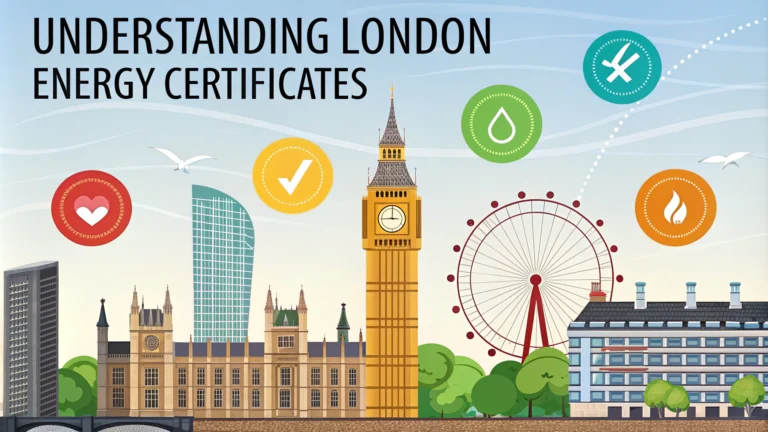Energy Performance Certificates (EPCs) are legal requirements for properties in London being sold, rented, or built.
An EPC provides detailed information about a property’s energy efficiency rating from A (most efficient) to G (least efficient) and includes recommendations for improvements.
Whether you’re a landlord, tenant, buyer or seller in London, understanding EPCs helps you make informed decisions about property costs and environmental impact.
Key Points About London EPCs
- Valid for 10 years from date of issue
- Must be ordered before marketing a property
- Costs between £60-£120 for a residential property
- Required for properties over 50 square meters
- Exemptions apply for listed buildings and places of worship
When You Need an EPC in London
- Selling your property
- Renting to new tenants
- Building a new property
- Making significant modifications to existing buildings
How to Get an EPC in London
Contact an accredited domestic energy assessor through the EPC Register.
The assessment typically takes 45-60 minutes for a standard property.
The assessor will need access to all rooms, including the loft space if accessible.
Minimum Energy Efficiency Standards (MEES)
London rental properties must have a minimum EPC rating of ‘E’.
Landlords face fines up to £5,000 for non-compliance.
Properties below an ‘E’ rating cannot be legally rented without qualifying improvements or exemptions.
Improving Your EPC Rating
- Install or upgrade loft insulation
- Replace single glazing with double glazing
- Upgrade to an energy-efficient boiler
- Install LED lighting
- Add cavity wall insulation
Finding and Checking London EPCs
Search the government’s EPC register using the property’s postcode.
Download existing certificates free of charge.
Check validity dates and ensure the certificate matches the current state of the property.
Moving Forward with Your London Property
Keep your EPC accessible for potential buyers or tenants.
Consider implementing recommended improvements to increase property value and reduce energy bills.
Contact the London Energy Efficiency Fund at 020 7983 4000 for information about improvement grants and schemes.
Cost Benefits of EPC Improvements
Implementing energy efficiency measures can significantly reduce annual energy bills:
- Loft insulation: saves £150-£250 per year
- Double glazing: saves £85-£110 per year
- LED lighting: saves £35-£55 per year
- Modern boiler: saves £200-£300 per year
Common EPC Assessment Areas
- Building construction and insulation
- Heating systems and controls
- Hot water systems
- Window glazing
- Lighting fixtures
- Renewable energy installations
Future EPC Requirements in London
Proposed regulations aim to raise minimum standards:
- Rental properties must achieve ‘C’ rating by 2025
- All properties targeted for ‘B’ rating by 2030
- New builds must be ‘A’ rated from 2025
Maximizing Your Property’s Energy Potential
Regularly review your EPC recommendations to maintain property value and reduce environmental impact.
Consider professional energy audits for detailed improvement strategies.
Stay informed about government incentives and funding opportunities for energy improvements.
Document all energy efficiency upgrades for future EPC assessments.
FAQs
- What is an Energy Performance Certificate (EPC) and why do I need one in London?
An EPC is a legal requirement for properties being sold or rented in London. It rates a property’s energy efficiency from A (most efficient) to G (least efficient) and is valid for 10 years. - How much does it cost to get an EPC in London?
EPC costs in London typically range from £45 to £120, depending on the property size and location. Prices may be higher for larger properties or urgent assessments. - When do I need to get an EPC when moving to London?
If you’re buying or renting a property, the landlord or seller must provide an EPC before you move in. If you’re selling or letting, you must have an EPC available before marketing the property. - Are there any properties exempt from requiring an EPC in London?
Yes, listed buildings, temporary buildings used less than 2 years, places of worship, and standalone buildings with less than 50 square metres of floor space are exempt. - How do I find an accredited EPC assessor in London?
Use the UK government’s approved assessor register or contact accredited certification bodies. Always ensure your assessor is qualified and registered with an approved certification scheme. - What information is included in a London property’s EPC?
The certificate includes current and potential energy efficiency ratings, estimated energy costs, recommendations for improvements, and potential cost savings from implementing suggested measures. - What is the minimum EPC rating required for rental properties in London?
Currently, rental properties must have a minimum EPC rating of E. From 2025, new tenancies will require a minimum rating of C, extending to all tenancies by 2028. - Can I transfer my EPC when moving within London?
If you’re moving within London, your existing EPC stays with the property you’re leaving. Your new property must have its own valid EPC provided by the seller or landlord. - How can I improve my property’s EPC rating in London?
Common improvements include installing double glazing, improving insulation, upgrading heating systems, using energy-efficient lighting, and installing smart meters. - Where can I check if a London property already has a valid EPC?
You can check the EPC Register website using the property’s postcode to find existing certificates and their validity dates.







